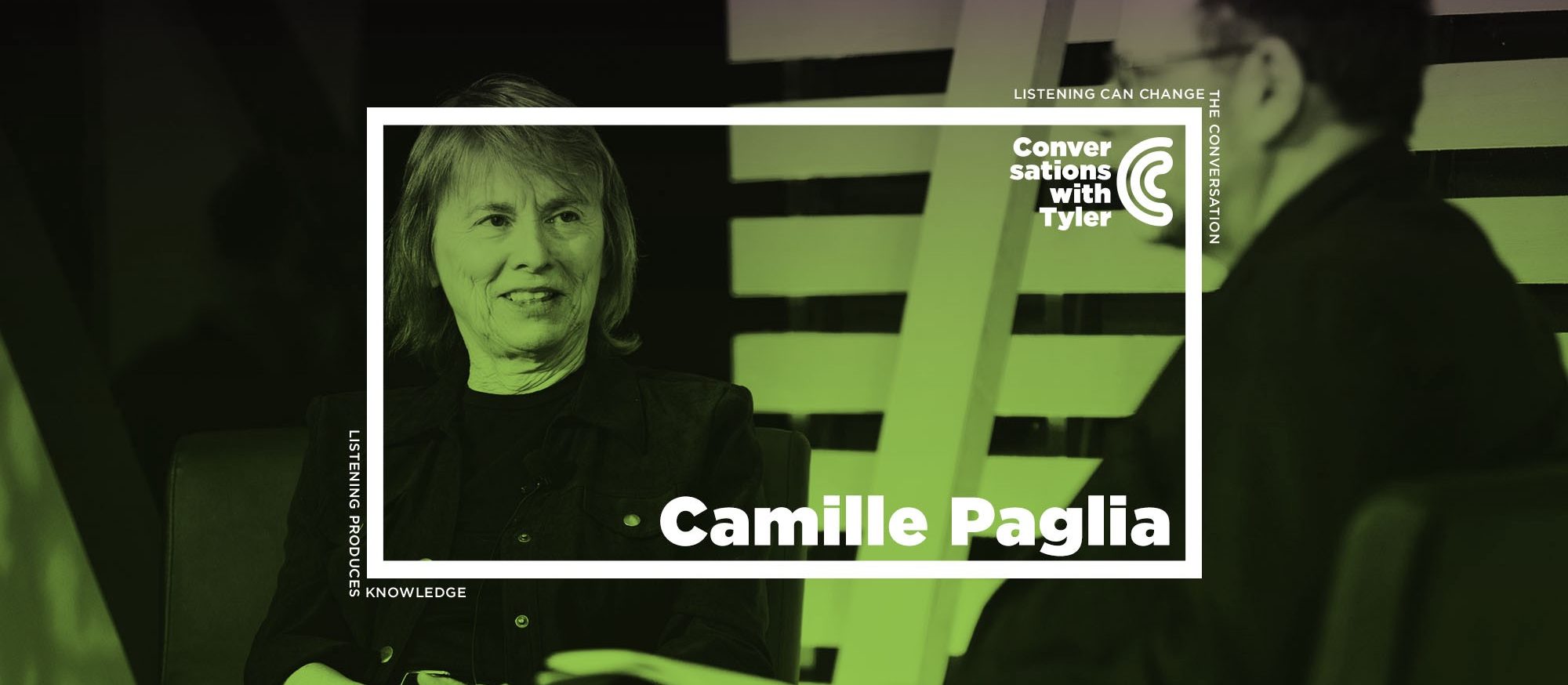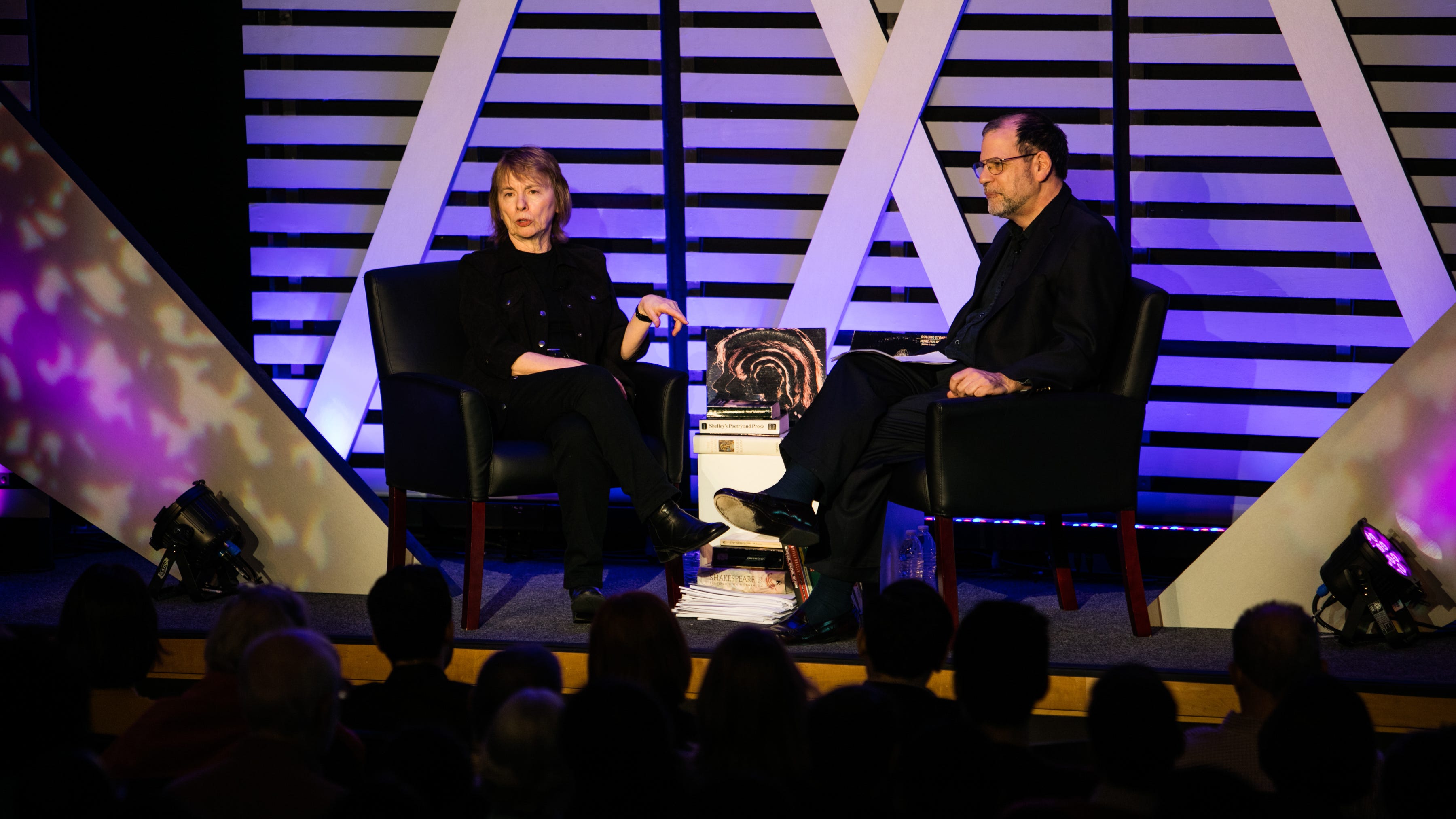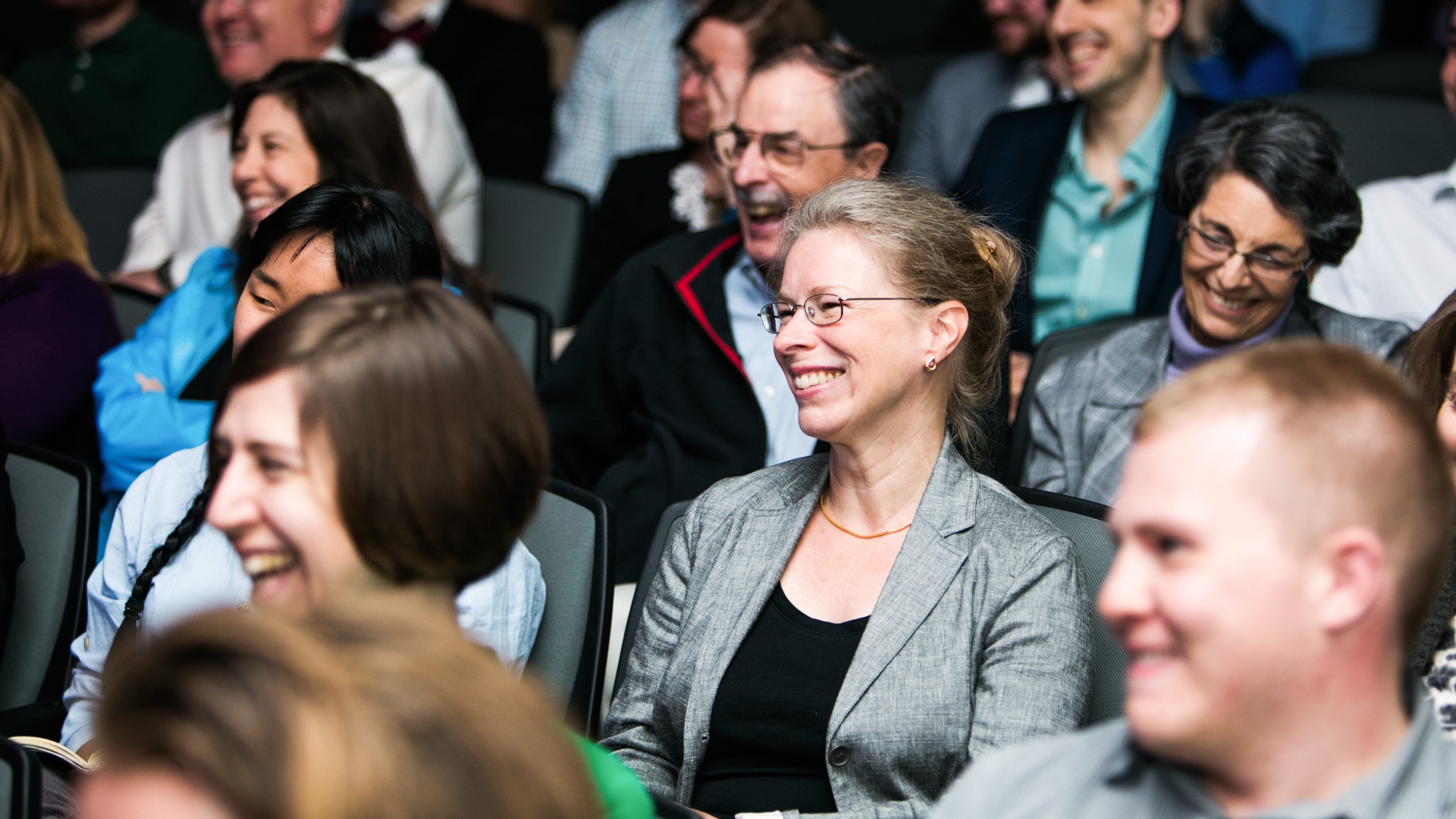Camille Paglia joins Tyler Cowen for a conversation on the brilliance of Bowie, lamb vindaloo, her lifestyle of observation, why writers need real jobs, Star Wars, Harold Bloom, Amelia Earhart, Edmund Spenser, Brazil, why she is most definitely not a cultural conservative, and much more.
Watch the full conversation
Read the full transcript
TYLER COWEN: Camille has written the very best essays ever on Edmund Spenser, Alice in Wonderland, and the Marquis de Sade. She understands Bob Dylan and Susan Sontag — .
PAGLIA: [hisses]
COWEN: And she has pursued a career of great integrity. That’s my introduction for Camille.
PAGLIA: Oh! [laughs]
COWEN: I’d like to start with a question from a reader. I asked readers for questions. “How do you feel about the fact that Silicon Valley dominates our economy and culture? Is there any tech guru you’re interested in?”
PAGLIA: Well, no. My last big tech guru was probably Marshall McLuhan. Had a prophetic insight into what was about to happen. He’s kind of the patron saint of my working on the web from the very first issue of Salon in 1995. It’s hard to believe that the web wasn’t taken seriously by already-established journalists.
There was a major political reporter at the Boston Globe, for example, who tried to pressure me not to write for the web. He said, “Oh, no one takes the web seriously.” It’s an enormous thing that’s happened. Which, of course, has also sucked in a whole generation of young people, alas. That’s all they know. I think we’re kind of on the downside of that right now.
COWEN: Take your last book, Glittering Images, and your other work, which emphasized the role of the iconic in Western and Eastern culture, the role of the spectacular. Vivid visual life-giving spectacular events. Now here we have people, they look, they listen on very small smartphones. Is this culture dead? But if the culture was so splendid, why did people give it up so quickly?
PAGLIA: The reason I wrote Glittering Images is because I felt that there’s an avalanche of fragmented visual impressions — disconnected, glaring, tacky, badly designed — that young people are growing up in. I think it really is true that children’s brains are being reshaped. The standard forms for logic and for sequential information and for reasoning, everything’s kind of disappearing. I tried to write a book where people would just stare at an image for a certain length of time.
I think it’s getting worse and worse. Web design, which my school, University of the Arts, teaches — I think web design is in the pits. I thought web design was moving into becoming a major genre of the arts. I think we’re in a kind of swirling vortex — and yes, what you mentioned about the miniaturization of image is terrible.
I was raised in a time, 1950s, when Hollywood was competing with television by doing something which television couldn’t do, with those gigantic screens. Like in The Ten Commandments, there’s a giant thing of Pharaoh, a giant sculpture. It starts at one end of the screen and you watch it go to the other end of the screen. Phenomenal. Lawrence of Arabia, oh my God, the dunes of Lawrence of Arabia with that music.
There’s no sense of the large. Young people have no sense whatever of the expansive, of the big gesture.
COWEN: But do we maybe overrate the large? If the large gave through so quickly, so readily, to what you’re describing as this kind of mediocrity, what was wrong with that culture of the ’50s, ’60s, and ’70s to begin with?
PAGLIA: I would say that a culture always moves in cycles. You have periods that esteem the colossal, like the Bernini Renaissance and Baroque periods. Then you get the small, the art of the small. The Rococo is a kind of evanescence, evaporation of the big Baroque swirls. All of a sudden it’s little tiny things like on a Valentine’s card.
I think we go back and forth. I just feel lucky, I think, that I have a kind of epic imagination, because I was raised watching The Ten Commandments and Ben-Hur. Oh my God, Ben-Hur. I could watch that 300 times.
COWEN: It’s one of your 10 favorite movies, right?
PAGLIA: Yeah.
COWEN: It’s the one on the list that’s surprising.
[laughter]
PAGLIA: Torment. And the music composed for those things. It directly inspired my writing of Sexual Personae, absolutely. I’m directly inspired by music. I think for women it’s good to have something that’s going to make you assert and trample [laughs] and conquer. It animates me. These are my maxims.
COWEN: Given what you’re saying, do you today consider yourself a cultural conservative?
PAGLIA: No, not at all.
COWEN: Why not? Everything used to be better. Isn’t that — ?
[laughter]
PAGLIA: No, we’re in a period of decadence, a falling off, you see. No, conservative would mean that I would be cleaving to something past, which was great, and no longer is, and I would be saying, “We need to return to that.” Usually I’m not saying we need to return to anything. I do believe we’re moving inexorably into the future. There’s a momentum to that. I’m a libertarian. That’s why I’m always freely offending both sides.
[laughter]
PAGLIA: Liberal, conservative. I’m a Democrat, even though I’m constantly criticizing — I think a true intellectual should be always beyond partisanship.
COWEN: And always criticizing.
PAGLIA: Yes, and always critiquing the premises of your own friends and allies.
COWEN: In the back, we were talking about Brazil. You mentioned you’ve been there nine times?
PAGLIA: Yes. Nine or ten.
COWEN: What does Brazilian culture have which North American culture lacks? What’s the draw?
PAGLIA: It’s such a polyglot of cultures and ethnicities. But beyond that, Brazilians understood my work from the first moment I began to publish. Because what they understood was artifice, art — because of Carnival for them, and costuming, masquerade, and that baroque exuberance, and the syncretism of Christianity with the Yoruba cults of West Africa in Salvador de Bahia.
They understood my vision of art and beauty — and beauty as an incredibly important human principle, rather than the way it was being trashed by my fellow feminists at that time.
They also understand nature, the grandeur of nature, the power of nature. It’s much larger.
COWEN: Iguaçu, right?
PAGLIA: Yes, instead of these silly little arguments that, “Oh, climate change is causing the end of the world.” Oh my God. Anyone who talks like that does not understand the grandeur and the power of nature. To imagine that we can make a change in it is so absolutely absurd.
COWEN: What’s your theory of modernity that puts them on one part of the curve, and we’re on another, more decadent part of the curve? What’s the difference? What’s what we would call the structural equilibrium as economists, if I dare invoke such a thing?
PAGLIA: Brazil, it’s in its own world. It’s not been part of the world wars. It doesn’t have this huge militaristic superstructure. It doesn’t have a messianic view of itself politically. The politics are always chaos [laughs] and drama. It’s like in grand opera. It’s like another planet, really, Brazil.
On George Lucas and Star Wars
COWEN: To continue the whirlwind tour of Camille Paglia, you wrote in Glittering Images that George Lucas was perhaps, or maybe definitely, the greatest artist of our time. I do not disagree with that, but now that you’ve written that, The Force Awakens has come out, which is not George Lucas. It’s Disney, who is not the greatest artist of our time.
PAGLIA: It has nothing to do with George Lucas.
COWEN: What did you think?
PAGLIA: I haven’t seen it. I wouldn’t dream of going. When it’s on TV, I’ll look at it. Please. Do you think I want to sit in a theater and be tortured by the contamination of my ideals? I’m not going to do that.
[laughter]
COWEN: You’ve spoken very highly of the prequels, which many people don’t like at all.
PAGLIA: Yes.
COWEN: What is it that people don’t get about the prequels? They say Jar Jar Binks, and they scream, and they run away.
PAGLIA: I can’t tell you.
COWEN: Clutching their head.
PAGLIA: I know exactly what they’re talking about.
COWEN: Tell us what’s good about the prequels.
PAGLIA: It was Revenge of the Sith — after the great volcano planet climax of Revenge of the Sith. I think it’s one of the greatest sequences in all of modern art. The thing is once I had written about it, I realized, as I went out in the world, how few people had actually seen the movie, because people had given up on the prequels long before.
Therefore, I think anyone who dismisses what I say about the sublime quality, the vision, the execution, the emotions, and the passions of that scene, they don’t know what I’m talking about, because they haven’t exposed themselves to it.
On popular music, both past and present
COWEN: Music. Rolling Stones. There are the two albums, Hot Rocks, More Hot Rocks. You wrote about the Rolling Stones some time ago, but if I look at the career of the Stones — they have a new album coming out this year — I find it striking that they’ve kept on going. And I actually count that as a mark against them.
I still think they’re good, but when I go back and listen, I never hear new things in their music. Now that some time has passed, what would you say about the Rolling Stones, and do you agree that you’re a little disappointed with them?
PAGLIA: I haven’t been following them for many, many years. To me, the Rolling Stones were a revolution when they happened, in that period when the Beatles were all upbeat. Then, here come these surly guys sneering, and spitting, and so on.
COWEN: But the Beatles were dark and subtle, too, right?
PAGLIA: Not like the Stones. Here’s the difference. The Rolling Stones are inspired by, animated by, to this day, by the blues tradition. The Beatles really were more almost Broadway and musical comedy.
COWEN: British music hall.
PAGLIA: Yes, British music hall and Tin Pan Alley, and so on. They were tremendous songsmiths, but there’s nothing dark about them. In other words, Paul McCartney is a wonderful bass player, but you’re not getting the big, roaring sounds of Bill Wyman’s bass at the beginning of the Stones’ career.
I really have not been following the Stones. Ever since Bill Wyman left the Stones, I have not felt that this was the Stones I knew. I’m delighted that they go on, and that they perform, and so on, but I have absolutely no interest in exposing myself to those horrible arena conditions for music. Oh my goodness, just the light shows and the this and the that. They’re not musical experiences. They’re social experiences now.
COWEN: What’s the music from classic rock that when you listen to it today, every single time you hear more in it? I would say Brian Wilson and Jimi Hendrix. Every time I hear them, it sounds different and fresher for me. What are your picks?
PAGLIA: Jimi Hendrix is one of the great geniuses of any instrument in the last a hundred years. Obviously, his music has lasted and is still fresh. For me, there’s a whole period there I teach in my Art of Song Lyrics course. I just was doing Crosby, Stills & Nash, “Wooden Ships,” and it still has this incredible power.
I love that entire period of the 1960s, the music. It was a magic moment. Still in the ’70s, Led Zeppelin, “When the Levee Breaks.” It still has enormous power. A lot of that music that Jimmy Page was doing. A lot of it working in the studio, actually. It wasn’t just live music.
COWEN: Fast-forward back to the present. Who would be a musical artist today — I know you’ve written Taylor Swift is a pestilence, so it’s probably not her.
[laughter]
PAGLIA: Taylor Swift is like a nightmare.
COWEN: Who would be the musical artist today who stands up to the giants of the past?
PAGLIA: Stands up working today?
COWEN: Working today or close to today. The last 10 years.
PAGLIA: I was really very hopeful about Rihanna for a while there. Unfortunately, she’s not really working with the top producers any longer. The new album is an atrocity. It’s really terrible. It’s sad, because there are so many people with talents who are not being developed.
It’s because our music industry is now very formulaic. Young people can’t really move along studying their instruments and getting their chops over a period of time. There’s nothing to draw on in the way that the musicians of my generation could draw on the folk tradition, the folk music.
COWEN: You’re sounding like a cultural conservative. [laughs]
PAGLIA: I’m just saying there’s certain moments, certain magic moments, of fertility or creativity that happened in many of the arts. You can find certain key moments where there’s a confluence of influences and a certain richness. In that very moment, it’s a great time to be alive, to be young.
For example, Shakespeare would not be Shakespeare if he were alive today. As it happens, he left Stratford — for whatever reason — went to London at a magic moment when theater was flourishing, which was only for a few decades, and then it was out again. There’s a certain kind of luck. If you’re the right person at the right time in any one of the artistic genres.
COWEN: Kanye West? Every album is different. He draws upon a lot of sources from the past.
PAGLIA: Oh my God. The bloat.
COWEN: Inspired by rap, rhythm and blues, no?
PAGLIA: What can I say?
On higher education
COWEN: I understand. Education, some questions about education. There’s a new model school called Minerva, where you take four years, you spend each of the four years in a foreign country. One year in Buenos Aires, one in Istanbul, one in Bangalore, I think.
You work in small classes, but the classes are all online. There’s no library. There’s no formal campus, per se. It’s been around for about two years. What do you think? What’s your prediction?

PAGLIA: I think the idea of sending young people abroad is great. I think that is a proper use of the money that’s going down the tubes at the major universities right now. For parents to think — it would profit young people a lot to be exposed to the world. Right now, our primary school education is absolutely appalling in its lack of world history and world geography.
I know because I get everyone in my classroom. I’m lucky I teach at a kind of school where I’m getting students from a wide range of preparation. There might be a couple private school people, but people from the inner city, from good schools, from bad schools. I really have a very clear sense, after 40 years of teaching, what’s going on at the primary school level.
It is unbelievable how little they know. It is absolutely shocking how little they know. This is a recipe for a disaster. I say yes, send them abroad. Fantastic idea.
This other thing of the online thing, I don’t believe this online thing at all. I think that you need a live person, and you need a live person who can talk extemporaneously and respond to the moment. Not just people who are reading the same old damn lecture over and over again.
Also, the kind of teaching that goes on in the Ivy League where there’s a flattering. There’s these small seminar things.
COWEN: The A-minus seminar, right?
PAGLIA: There’s all this practice and learning how to talk in a slightly pretentious way about things and impressing each other. So what? They’re all packaging them for the bourgeoisie.
COWEN: Send them to Brazil, right?
[laughter]
PAGLIA: They’re so proud of themselves as they produce all these clones, these polished, bourgeois clones, witless, knowing nothing.
COWEN: Speaking of inspiring teachers, what’s your favorite Harold Bloom story — that you can tell?
PAGLIA: My favorite? You mean personal story?
COWEN: Personal story.
PAGLIA: I don’t know about favorite, but if you want to know the story — .
COWEN: The story, please.
PAGLIA: Here’s the story. I never took a course with Harold Bloom. I was in graduate school at Yale, and I just never took a course with him, so I didn’t know him at all. And then he heard — one time I encountered him — uh-oh, I shouldn’t say this. OK, maybe. Let’s say he would come a-courting with a famous poet, who was a friend of his.
I would see him turning up at a doorway. “Hello, hello, hello,” OK, that’s all. I just knew him to say hello to him. Then, he heard what I was going to be working on and that I was having trouble finding a dissertation director for a study of androgyny in literature and art.
That’s a time when nobody was doing — it’s hard to believe now because everything is sex and gender everywhere — but at the time, no one was doing a dissertation on sex at the Yale Graduate School. It’s hard to believe. He summoned me to his office. That’s really how we met. He said, “My dear, I am the only one who can direct that dissertation,” and I said, “OK.” That was it.
He understood everything. He understood everything I wanted to do with the book, and he understood my ideas. He was a fantastic resource for me in so far as he also supported me or gave me confidence throughout all those decades when I couldn’t get it published. Sexual Personae was rejected by seven publishers and five agents.
By the time it was published, I was 43 years old. I’m a great role model, it seems to me, for people to just soldier through adversity and rejection and just continue to develop the craft. Eventually, hopefully, one will see one’s work in print.
COWEN: What did he think of you and Sexual Personae?
PAGLIA: Of course, he always said I gave him great naches, which is sort of like of a father to a daughter, et cetera. He and I agree about Freud. We have a Freudian psychohistory and so on.
On things under- and overrated
COWEN: There’s a segment of all of these conversations in the middle. It’s called underrated or overrated. I mention something, and you tell me if you think it’s underrated or overrated by our society.
PAGLIA: By our society or by me?
COWEN: Your opinion relative to the society opinion. Now, don’t hold back on these. Tell us what you think.
[laughter]
COWEN: First one, economics.
PAGLIA: Economics as a field?
COWEN: As a field. Overrated or underrated?
PAGLIA: Probably underrated.
COWEN: Why?
PAGLIA: I don’t know. I just think that economists are figures of fun sometimes in cartoons. I’m just judging by what I sense.
COWEN: William Faulkner.
PAGLIA: He’s totally gone, poor man. Actually, I’ve been commenting on this recently to my friends. I said, “You remember that period when Faulkner was everywhere, and everyone read him? He was just a baseline figure.”
Thanks to Kate Millett and all these philistine feminist types in the early ’70s, there was a great sweeping away of many, many major male figures in the history of literature including Ernest Hemingway, D. H. Lawrence, who had a huge influence on me.
If you are a resident of Mississippi, Faulkner still lives and is vivid. I think, outside of that, it’s been years since I’ve heard Faulkner mentioned.
COWEN: You’re saying underrated?
PAGLIA: I think he should be on the reading list. I don’t know. Perhaps he was overrated in our time, but he certainly was a major author and a major influence on American literature, for heaven’s sake. Young people aren’t reading him, and they aren’t reading many of the great authors.
COWEN: Yoko Ono, overrated or underrated?
PAGLIA: Yoko Ono, don’t start me on Yoko Ono. One of my least favorite people in the universe. Yes, I blame her for the breakup of the Beatles.
[laughter]
PAGLIA: All that screechy yodeling that went on. Oh my God, she’s a horror. But, I gave her her due in Glittering Images, because she was a very important figure in the development of conceptual art. She really was very innovative in the 1960s, but what a dreary, humorless person.
COWEN: When I think of a lot of your books, especially if I contrast you to Marxist criticism, I think of your emphasis as being a lot of metaphysics in a very exciting, big-picture way. Let’s say we take a writer, very high quality, but she moves very far from metaphysics. She writes about small numbers of people in rural Ontario, Alice Munro.
PAGLIA: Oh, I don’t read fiction. I don’t read contemporary fiction. I have absolutely zero interest in contemporary fiction. The last contemporary fiction I had any interest in is Auntie Mame, and I’m not kidding. I like plays like Tennessee Williams.
The fiction writers are off in another world. They don’t see the world as it exists now. They don’t use the language of the contemporary world. Their English is utterly stale and cloistered. I cannot read a page of contemporary fiction, I’m sorry. Anything that’s pre–contemporary fiction, I’m a great admirer of. Believe me, these are the kind of books I’ll open like this and like that.





